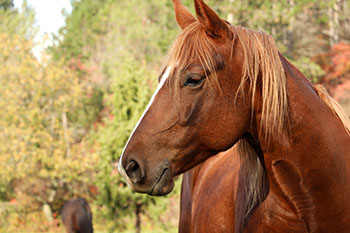West Nile Virus detected in Middle Tennessee horse
May 02, 2022

The state veterinarian confirms that a horse in Smith County has tested positive for West Nile Virus (WNV). The 22-year-old horse has been euthanized.
Mosquitoes transmit WNV and although humans can contract the virus, horses do not transmit the disease to humans or horses. Symptoms in horses may include fever, weakness, loss of appetite, or convulsions. There is no cure for WNV, and the illness can cause lasting effects and can be fatal.
“There are actions horse owners can take to prevent WNV,” State Veterinarian Dr. Samantha Beaty said. “Good preventative care includes control of mosquitoes and vaccination against WNV. Work with your veterinarian on a vaccination plan for your animals and manage the environment around your animals to deter mosquitos.”
Tips to prevent viruses include:
• Eliminate standing water sources and damp areas where insects could gather and breed.
• Manage manure and disposal.
• Keep barns clean and apply fly sprays and insect repellants as needed.
• Never share needles, dental, or surgical equipment among different animals.
The Tennessee Department of Agriculture’s Animal Health Division is responsible for promoting animal health in Tennessee. The state veterinarian’s office seeks to prevent the spread of disease through import and movement requirements, livestock traceability, disaster mitigation, and the services of the C.E. Kord Animal Health Diagnostic Laboratory. The division collaborates with other health-related stakeholders, academic institutions, and extension services to support One Health, an initiative to improve health for people and animals.
For more content like this, check out the latest issue of the Cooperator.
Mosquitoes transmit WNV and although humans can contract the virus, horses do not transmit the disease to humans or horses. Symptoms in horses may include fever, weakness, loss of appetite, or convulsions. There is no cure for WNV, and the illness can cause lasting effects and can be fatal.
“There are actions horse owners can take to prevent WNV,” State Veterinarian Dr. Samantha Beaty said. “Good preventative care includes control of mosquitoes and vaccination against WNV. Work with your veterinarian on a vaccination plan for your animals and manage the environment around your animals to deter mosquitos.”
Tips to prevent viruses include:
• Eliminate standing water sources and damp areas where insects could gather and breed.
• Manage manure and disposal.
• Keep barns clean and apply fly sprays and insect repellants as needed.
• Never share needles, dental, or surgical equipment among different animals.
The Tennessee Department of Agriculture’s Animal Health Division is responsible for promoting animal health in Tennessee. The state veterinarian’s office seeks to prevent the spread of disease through import and movement requirements, livestock traceability, disaster mitigation, and the services of the C.E. Kord Animal Health Diagnostic Laboratory. The division collaborates with other health-related stakeholders, academic institutions, and extension services to support One Health, an initiative to improve health for people and animals.
For more content like this, check out the latest issue of the Cooperator.